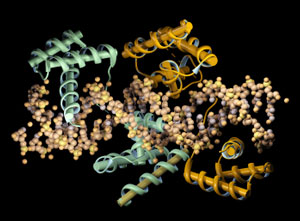
Effects of Turmeric Compounds on Transcription Factors, Co-Factors, and Oncogenes Involved in Cancer
| CANCER AND TRANSCRIPTION FACTORS, CO-FACTORS, AND ONCOGENES | |||
|---|---|---|---|
| How do they contribute to cancer? & How can turmeric compounds help? |
|||
|
Turmeric's Activity Depends on Type of Transcription Factor The turmeric compound curcumin and its analogues block a number of different transcription factors that activate oncogenes. These genes are involved in the development of cancer (carcinogenesis), tumor growth, and metastasis. (vi.2, 5, 7, 13, 34, 39, 41-43, 47-56) On the other hand, curcumin stimulates beneficial transcription factors. For example, some of these prompt genes to produce natural detoxifying antioxidants and enzymes. By quenching free radicals and getting rid of toxins, they help prevent cancer and stop malignant cells from replicating. (vi.2, 5, 7, 13, 34, 39, 41-43, 47-55, 57) Variations of Some Transcription Factors Can Act in Opposite Ways in Cancer Curcumin increases activation of the transcription factor PPAR-γ and PPAR-α. Both of these transcription factors help control cell growth. PPAR-γ also helps regulate inflammatory and immune system responses in cells. When activated in the presence of cancer cells, PPAR-γ suppresses tumor growth and metastasis. It does so by: (vi.39, 42, 58-62)
Conversely, PPAR-δ prevents cancer cells from dying. High levels of PPAR-δ are found in several different types of cancer, such as: (vi.4, 42, 58-59, 63-65) Lab studies show curcumin suppresses PPAR-δ in cancer cells. (vi.4, 42, 58-59, 63-65) Curcumin's Effects are Cancer-Dependent Studies show that the way turmeric's curcumin compounds regulate transcription factors depends on the type of cancer they encounter. In fact, curcumin sometimes stimulates a transcription factor in one cancer but blocks the same factor in a different type of cancer. Medical researchers suggest that these seemingly contradictory effects could actually be an indication of curcumin's ability to adjust its behavior depending upon the type of cancer involved. (vi.66) For example, in lab tests curcumin blocks the growth of colon cancer by suppressing Egr-1, which inhibits the epidermal growth factor (EGF) and its receptor (EGFR) proteins. But it activates Egr-1 to stimulate production of tumor suppressors that block glioblastoma type of brain tumor cells from growing. (vi.66) AHR — Detoxifying or Carcinogenic Transcription Factor?Interestingly, aryl hydrocarbon receptor (AHR) is another transcription factor that turmeric's curcumin compounds help regulate. Certain toxic chemicals linked to cancer bind to and activate AHR, which then triggers genes to make phase I and II metabolizing enzymes. These enzymes break down the toxins and lead to cancerous activity in cells. Higher levels of both AHR and phase enzymes are associated with more aggressive cancer cell lines. (vi.67) Curcumin compounds in turmeric also activate AHR and lead to higher levels of liver enzymes. However, studies suggest that when it's activated by natural compounds such as curcumin, AHR may actually help prevent cancerous activity. How does this happen? One study involving head and neck cancer cells exposed to tobacco toxins and treated with curcumin may explain the difference. Even though the turmeric compound activated AHR and increased phase enzyme levels, it prevented the enzymes from breaking down the tobacco toxins into the more carcinogenic metabolites. (vi.67) Curcumin also activates AHR in leukemia cells and induces cancer cell death. However, studies have determined that while curcumin promoted apoptotic death in leukemia cells, binding to AHR was not the primary reason for its cancer-suppressing effects. (vi.68) Curcumin Curtails the Activity of Cofactors Studies indicate that curcumin helps regulate expression of some cofactors that activate transcription factors involved in cancer development and progression. For example, curcumin can inhibit expression of the androgen receptor transcription factor (AR), involved in prostate cancer, by blocking AR's cofactors. (vi.5, 39, 69-70) Other Active Turmeric Compounds Other compounds in turmeric known to have beneficial effects on transcription factors involved in cancer include:
|
|||
| SPECIFIC EFFECTS OF TURMERIC COMPOUNDS | |||
| ↓ Akt | ↓ c-jun | ↓ MDM2 | ↓ Skp2 |
| ↓ AP-1 | ↓ c-myc | ↓ MITF | ↓ Sp-1, Sp-2, Sp-3 |
| ↓ AR | ↓ COX-2 | ↓ NF-κB | ↓ STAT1 |
| ↑ ATM | ↑ ↓ CREB | ↑ Nrf2 | ↓ STAT3 |
| ↓ β-catenin | ↓ E2F-1 | ↑ PPAR-α | ↓ STAT4 |
| ↑ BTG2 | ↓ E2F-5 | ↑ PPAR-γ | ↓ STAT5a & b5 |
| ↓ CBP | ↓ Egr-1 | ↓ PPAR-δ | ↓ Wilms' tumor |
| ↑ CHOP | ↓ EIF4E | ↓ p300 | |
Join the 1000s of People Who Are Discovering the Benefits of Turmeric.

Healthceuticals® Turmeric Curcumin Complex
100% Certified
Organic ingredients
- Organic Turmeric Extract - standardized to 95% curcuminoids.
- Organic Whole Turmeric - provides full spectrum antioxidant, anti-inflammatory turmeric benefits, including turmerones and numerous vitamins, minerals, and phytonutrients
- Organic Black Pepper Extract - standardized to 95% piperine; dramatically enhances bioavailablity.
- Organic Phospholipids - markedly improve absorption.
- Organic Ginger - works synergistically with turmeric to provide more powerful benefits.
- Absolutely FREE of potentially harmful additives and fillers such as magnesium stearate.




